
What is Criminal Negligence in Texas?
 In Texas, there are some criminal offenses for which a person can be liable if they acted with “criminal negligence.” When most people think of “negligence,” they think of a civil standard used in lawsuits for money damages. But criminal negligence, the courts have reasoned, is different from ordinary civil negligence.
In Texas, there are some criminal offenses for which a person can be liable if they acted with “criminal negligence.” When most people think of “negligence,” they think of a civil standard used in lawsuits for money damages. But criminal negligence, the courts have reasoned, is different from ordinary civil negligence.
Section 6.03(d) of the Texas Penal Code states that “a person acts with criminal negligence, or is criminally negligent, with respect to circumstances surrounding his conduct or the result of his conduct when he ought to be aware of a substantial and unjustifiable risk that the circumstances exist or the result will occur. The risk must be of such a nature and degree that the failure to perceive it constitutes a gross deviation from the standard of care that an ordinary person would exercise under all the circumstances as viewed from the actor’s standpoint.”
How does Criminal Negligence Differ from Civil Negligence in Texas?
Civil or simple negligence means the failure to use ordinary care, that is, failing to do that which a person of ordinary prudence would not have done under the same or similar circumstances. Montgomery v. State, 369 S.W.3d 188, 193 (Tex. Crim. App. 2012). Conversely, conduct that constitutes criminal negligence involves a greater risk of harm to others, without any compensating social utility, than does simple negligence. Id. The carelessness required for criminal negligence is significantly higher than that for civil negligence; the seriousness of the negligence would be known by any reasonable person sharing the community’s sense of right and wrong. Id. The risk must be substantial and unjustifiable, and the failure to perceive it must be a gross deviation from reasonable care as judged by general societal standards by ordinary people. Id.
For example: The Texas Court of Criminal Appeals has held that criminally negligent homicide requires not only a failure to perceive a risk of death, but also some serious blameworthiness in the conduct that caused it (i.e., risk must be “substantial and unjustifiable,” and the failure to perceive that risk must be a “gross deviation” from reasonable care).
In finding a defendant criminal negligent, a jury is determining that the defendant’s failure to perceive the associated risk is so great as to be worthy of a criminal punishment. The degree of deviation from reasonable care is measured solely by the degree of negligence, not any element of actual awareness. Whether a defendant’s conduct involves an extreme degree of risk must be determined by the conduct itself and not by the resultant harm. Nor can criminal liability be predicated on every careless act merely because its carelessness results in death or injury to another.
Case Law Examples of Criminal Negligence Standard in Texas
McKay v. State, 474 S.W.3d 266 (Tex. Crim. App. 2015): The Court of Criminal Appeals holding insufficient evidence of criminal negligence to support Defendant’s conviction for injury to a child after he spilled hot water on the two-year-old child while he was in the kitchen, because there was no evidence that Defendant failed to perceive a substantial and unjustifiable risk to the child. There was no showing that the child was often underfoot or that defendant knew the child could likely be under his feet while moving around in the kitchen.
Queeman v. State, 520 S.W.3d 616 (Tex. Crim. App. 2017): The Court of Criminal Appeals holding insufficient evidence to support defendant’s conviction of criminally negligent homicide because the evidence presented does not show that Defendant’s failure to maintain a safe driving speed and keep a proper distance from other vehicles was a gross deviation from the standard of care that an ordinary diver would exercise under all the circumstances as viewed from Defendant’s standpoint at the time of his conduct.
Tello v. State, 180 S.W.3d 150 (Tex. Crim. App. 2005): The Court of Criminal Appeals upheld Appellant’s criminal negligent homicide conviction reasoning that Appellant should have perceived a substantial and unjustifiable risk of death from using a faulty trailer hitch without safety chains on a public road. The homemade trailer unhitched from Appellant’s truck and killed a pedestrian.

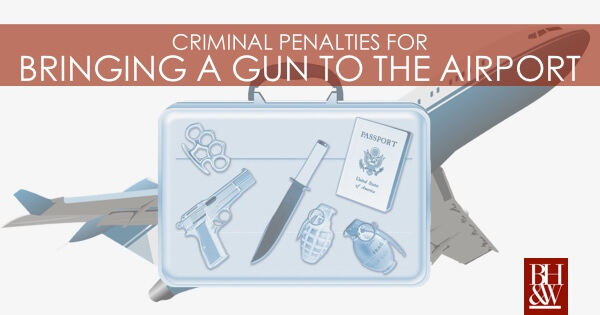
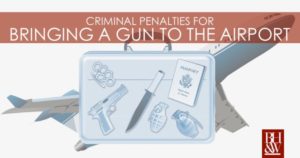 We love our guns in Texas. After all, those licensed to carry a handgun can now choose to conceal the handgun or wear it on their hip like in the old west. But carrying a handgun comes with its risks. Many places are designated as “off limits” for handguns. Chief among them is the airport. And everyday, well-meaning folks forget about their trusty handgun when they pack their bags and head to DFW International Airport or Love Field, only to be reminded by a less-than-friendly TSA agent as they attempt to pass through security. In fact, Texas is the #1 state for airport gun seizures in the country (and DFW International Airport leads the way in Texas).
We love our guns in Texas. After all, those licensed to carry a handgun can now choose to conceal the handgun or wear it on their hip like in the old west. But carrying a handgun comes with its risks. Many places are designated as “off limits” for handguns. Chief among them is the airport. And everyday, well-meaning folks forget about their trusty handgun when they pack their bags and head to DFW International Airport or Love Field, only to be reminded by a less-than-friendly TSA agent as they attempt to pass through security. In fact, Texas is the #1 state for airport gun seizures in the country (and DFW International Airport leads the way in Texas).






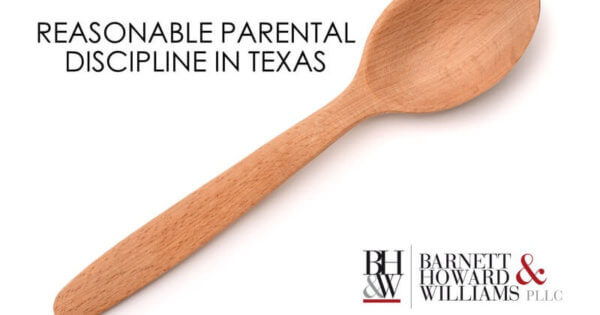
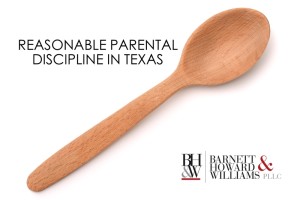 Is Spanking illegal in Texas? No, spanking is not illegal in Texas under most circumstances. The Texas Penal Code provides a defense for parents charged with Injury to a Child under Section 22.04 when the force was used to “reasonably discipline the child.”
Is Spanking illegal in Texas? No, spanking is not illegal in Texas under most circumstances. The Texas Penal Code provides a defense for parents charged with Injury to a Child under Section 22.04 when the force was used to “reasonably discipline the child.”
 You may have heard about Texas Stand Your Ground Law or The Castle Doctrine. These ideas refer to “standing your ground” in your “castle” against intruders by using deadly force to protect yourself. But do you know when you can use force and what kind of force can be used? Understanding the Texas gun laws is incredibly important so that you know exactly what you can and cannot do when protecting yourself or your home, car, or business.
You may have heard about Texas Stand Your Ground Law or The Castle Doctrine. These ideas refer to “standing your ground” in your “castle” against intruders by using deadly force to protect yourself. But do you know when you can use force and what kind of force can be used? Understanding the Texas gun laws is incredibly important so that you know exactly what you can and cannot do when protecting yourself or your home, car, or business.

 This was the 4th year for our law firm to offer scholarships. In honor of the sacrifices of our military veterans, we decided to that the scholarships should be connected to military service. The first scholarship is a $500 award for a
This was the 4th year for our law firm to offer scholarships. In honor of the sacrifices of our military veterans, we decided to that the scholarships should be connected to military service. The first scholarship is a $500 award for a 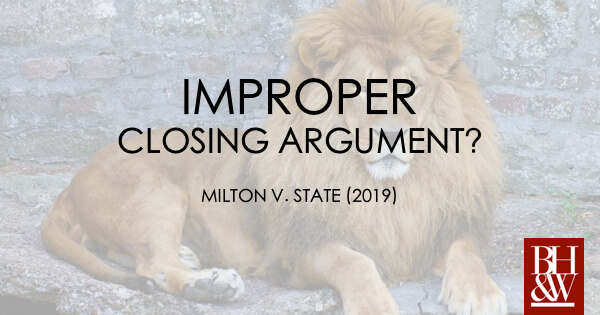
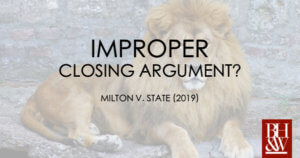 What do Atticus Finch, Lt. Daniel Kaffee, and Jake Brigance have in common? Each of these fictional movie attorneys are known for zealously representing their clients by delivering intense cross examinations and galvanizing closing arguments. Finch, defending a wrongly-accused man in a time a place where justice was compromised by racial bias, implored the jury to seek justice by tapping into a higher power, “In the name of God do your duty.” Stuck at the crossroads of respecting formal rank and seeking justice in a military court-martial, Lt. Kaffee made the choice to double down on Col. Jessep during cross examination, poking at the Colonel’s pride. Col. Jessep took Lt. Kaffee’s bait, screaming, “You can’t handle the truth!” Jake Brigance took a more creative approach. Asking jurors to close their eyes, Brigance described a depraved series of events that caused his client to murder two people. The jury agreed with the justification, and acquitted Brigance’s client.
What do Atticus Finch, Lt. Daniel Kaffee, and Jake Brigance have in common? Each of these fictional movie attorneys are known for zealously representing their clients by delivering intense cross examinations and galvanizing closing arguments. Finch, defending a wrongly-accused man in a time a place where justice was compromised by racial bias, implored the jury to seek justice by tapping into a higher power, “In the name of God do your duty.” Stuck at the crossroads of respecting formal rank and seeking justice in a military court-martial, Lt. Kaffee made the choice to double down on Col. Jessep during cross examination, poking at the Colonel’s pride. Col. Jessep took Lt. Kaffee’s bait, screaming, “You can’t handle the truth!” Jake Brigance took a more creative approach. Asking jurors to close their eyes, Brigance described a depraved series of events that caused his client to murder two people. The jury agreed with the justification, and acquitted Brigance’s client.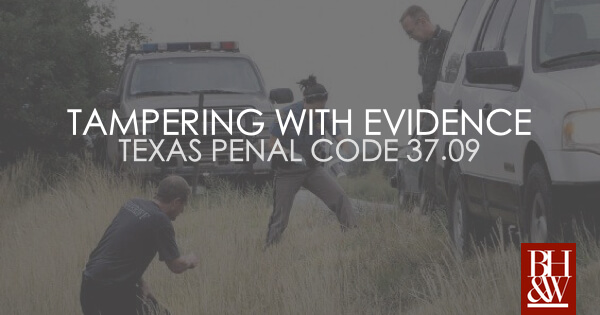
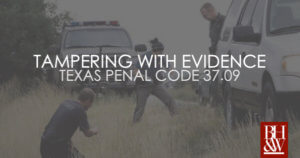 During routine traffic stops, police officers sometimes end up arresting individuals for the third-degree felony offense of Tampering with Evidence. How does this happen you ask? If, during the course of a traffic stop, an officer observes the driver toss an item or two out of the window, and those tossed items are later determined to be drugs and/or drug paraphernalia, the officer might just arrest the person for tampering with evidence pursuant to
During routine traffic stops, police officers sometimes end up arresting individuals for the third-degree felony offense of Tampering with Evidence. How does this happen you ask? If, during the course of a traffic stop, an officer observes the driver toss an item or two out of the window, and those tossed items are later determined to be drugs and/or drug paraphernalia, the officer might just arrest the person for tampering with evidence pursuant to 
 When a defendant is convicted of multiple crimes at the same trial, his sentences automatically run concurrently, unless there is an order for the sentences to be stacked (i.e. to run consecutively). When sentences are stacked, defendants are required to finish serving the sentence for one offense before they begin serving the sentence for another offense. So, if a defendant is convicted of multiple crimes, especially those with longer sentence ranges, the difference between stacking the sentences or running the sentences concurrently can be huge. Thus, it is very important to know when sentences must run concurrently, when sentences can be stacked, and who makes those decisions.
When a defendant is convicted of multiple crimes at the same trial, his sentences automatically run concurrently, unless there is an order for the sentences to be stacked (i.e. to run consecutively). When sentences are stacked, defendants are required to finish serving the sentence for one offense before they begin serving the sentence for another offense. So, if a defendant is convicted of multiple crimes, especially those with longer sentence ranges, the difference between stacking the sentences or running the sentences concurrently can be huge. Thus, it is very important to know when sentences must run concurrently, when sentences can be stacked, and who makes those decisions.





